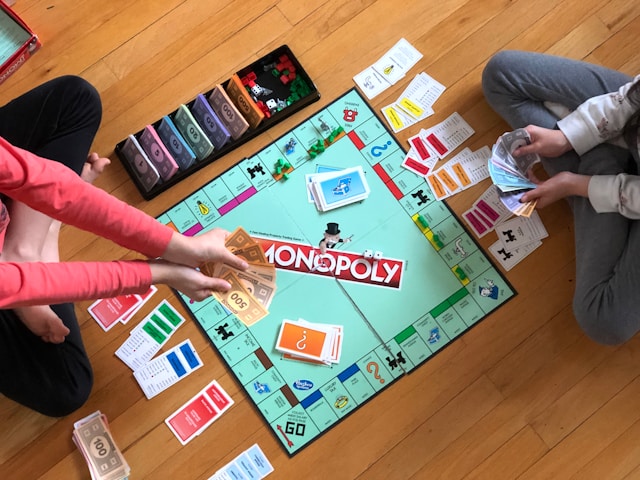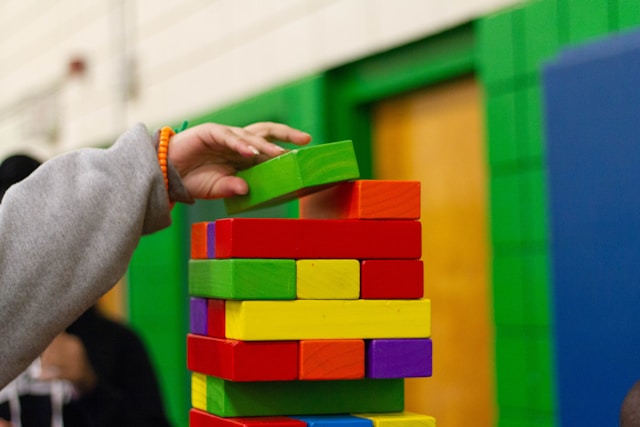Raising children in an age characterized by technology can present both exciting opportunities and unique challenges. While digital technology provides numerous educational tools, it can be easy to forget the timeless classics which continue to foster creativity, critical thinking skills, family bonding and family fun. Timeless classics which continue to provide both irreplaceable charm and educational value for our children. Here’s a glimpse of some such timeless gems.

Photo by Bradyn Trollip on Unsplash
The Case for Classic Games
Before diving into specific classic games, it’s important to understand why they remain such popular choices in our high-tech society. Many classic games provide benefits that newer digital versions cannot match. Such as encouraging face-to-face interaction, patience and strategic thinking training and tactile playback elements often missing from apps or video games. We will explore why classics offer more than nostalgia alone.
Solitaire: A Game of Patience and Strategy
Solitaire, also referred to as Patience in certain regions, has long enthralled generations with its accessible rules and its challenging yet rewarding nature. All that is required to begin is a standard deck of cards and a flat surface, from here the objective is to move all the cards into foundation piles organized by suit and ascending order from Ace to King. Solitaire provides many educational advantages, one being its capacity to foster critical thinking and strategic planning skills. Players must plan several moves ahead while considering different possibilities and anticipating potential obstacles. Cognitive engagement through games such as these is invaluable in developing problem-solving and patience skills, while simultaneously teaching perseverance. Success often comes after many failed attempts, encouraging children to remain determined when faced with obstacles and hurdles. Solitaire stands out as an exceptional tool to promote independent thought and self-reliance among children, making it an invaluable way of developing their independence from modern technology. Solitaire provides a quiet moment of calm for kids to focus on themselves without being distracted by technology’s distractions.
Chess: The Game of Kings
Chess, often dubbed as the “Game of Kings,” boasts an ancient and vibrant history dating back millennia, its roots can be found in ancient India. Chess, an ageless game renowned for its complex strategies and cognitive development benefits, involves two players fighting over an abstract board using sixteen pieces, including pawns, knights, bishops, rooks and queens to form teams against one another on an opposing checkerboard. Checkmating an opponent’s king requires deft maneuvering, precise planning and foresight. One of chess’ primary educational benefits lies in strengthening critical thinking abilities. As players navigate 64 squares, they must constantly assess and reassess the board, anticipate moves by their opponent and devise long-term strategies, this mental challenge sharpens analytical abilities while developing patience and discipline. Chess can improve memory and concentration, as players must recall past moves, recognize patterns, and maintain focus throughout a game. Furthermore, it teaches essential life skills like decision-making under pressure and adaptability. Each game of chess presents unique challenges for its participants, to succeed at each round they must remain flexible and think on their feet to do well. Chess offers children an ideal way to unplug from modern technology while engaging in an intellectually stimulating activity that fosters personal resilience. There is even the convenience of chess online for those who are still plugged in!
Scrabble: Crafting Wordsmiths
Word games like Scrabble can serve not only as entertainment, but as tools to develop language prowess and foster creativity. Alfred Butts invented Scrabble in the 1930s. Players must use lettered tiles with different point values to form interlocking words on a 15×15 grid to achieve points for their play. Players draw seven tiles randomly, and placing these strategically on premium squares can significantly boost scores, adding another level of tactical complexity to the game. As players construct words with Scrabble tiles, they expand their vocabulary, improve spelling and develop critical thinking about letter combinations and word possibilities. One of Scrabble’s distinctive characteristics is its educational value. Language games encourage an appreciation for language by prompting players to discover its complexities through exploration of word meanings and usage. Language games foster a competitive yet supportive learning environment where continuous improvement occurs over time. Scrabble also serves as a social bridge, uniting friends and family across generations in an intellectually stimulating activity they all can enjoy together. In an age dominated by digital interactions, Scrabble offers a welcome return to face-to-face communication and thoughtful dialogue.
Monopoly: Lessons in Economics
Monopoly provides more than just entertainment, it offers lessons in economics and financial management that can benefit anyone of any age. Monopoly offers players an invaluable lesson in budgeting, financial planning and strategic decision-making by simulating real estate transactions and investment opportunities. Players must prudently use their resources, choosing when and how best to purchase property, build houses and hotels or save for unexpected costs. This game introduces concepts such as mortgages, rent collection and bankruptcy, providing players with a real understanding of financial risks and rewards. Monopoly not only develops individual financial skills, but it also gives children an understanding of market dynamics and competition as they vie for property dominance and negotiate trades, experiences which provide essential skills necessary for successfully navigating real-world economic landscapes.

Photo by Maria Lin Kim on Unsplash
Clue (Cluedo): A Board Game that Puts Players Into Detective Mode
Clue, also known by the name Cluedo, is an iconic board game which places players into the role of detectives attempting to solve a murder mystery. In this game, players must uncover three crucial details: murderer, weapon used and location of crime. They must carefully gather clues and examine them closely while also coming up with hypotheses to test out and eliminate possibilities using both logic and intuition. Every turn offers an opportunity to gather useful information by offering suggestions and observing other players’ reactions. Participants develop critical thinking and problem-solving skills as they connect the pieces of evidence provided and determine when or if to reveal or withhold information. Clue offers both intrigue and the challenge of deduction, creating a compelling experience for budding detectives of all ages.
The Game of Life: Navigating Life’s Choices
First introduced in 1960, The Game of Life provides an engaging simulation of life from college through retirement with players taking control of various life events such as jobs, marriage and investments. Kids playing this game will gain insights into life’s milestones and the value of making wise decisions throughout. It provides an enjoyable way for families to discuss essential topics like career choices, education impacts, financial management practices and retirement planning strategies in an engaging format. The Game of Life gives us all a panoramic perspective of our journey and our personal responsibility throughout its journey.
Battleship: Strategic Warfare on a Grid
Battleship, the classic naval combat game, has long held a special appeal among players since its introduction in the early 20th century. This game pits two opponents against one another in a strategic naval battle, as each positions their fleet on an arrayed grid and takes turns calling out coordinates to launch attacks at their opponent’s ships. The goal is to sink their fleet before it sinks yours, and it can get intense. Playing Battleship can help strengthen strategic thinking and spatial awareness for children. Children must carefully plan their moves, anticipate an opponent’s strategy and respond accordingly. This promotes critical thinking and problem-solving abilities while the combination of luck and strategy makes each game an intriguing new challenge that makes this classic board game an enduring favorite across generations.
Snakes and Ladders: Serendipity and Strategy
Snakes and Ladders, originally developed in ancient India, is an engaging yet profound game of luck and chance. Landing on ladders or snakes teaches children about life’s unpredictability, its ups and downs help children understand its vicissitudes better. Ideal for younger children learning counting concepts. Additionally it subtly reinforces perseverance lessons by having players climb ladders only to slide off down snakes like life itself.
Backgammon: Roll of the Dice
One of the oldest known board games, Backgammon combines luck and strategy in an engaging way. Children must move their pieces based on dice rolls to balance risk with reward. Teaching kids how to play Backgammon introduces basic strategic concepts as well as probability. Its easy learning curve quickly unveils layers of depth which reveal themselves over time allowing children to develop analytical skills while understanding the interplay of chance and strategy.
Jenga: Tension and Balance
Jenga, although a relatively modern classic from the 80s, fits easily onto this list due to its simple yet engaging gameplay. Players stack wooden blocks and remove one by one without toppling their tower. Honing fine motor skills while testing patience while teaching kids how to think ahead and make calculated moves while the tension built with every turn makes this an engaging family game.

Photo by La-Rel Easter on Unsplash
Conclusion
In an age when entertainment has increasingly moved online, classic games offer us an important reminder of the value of face-to-face interaction, strategic thinking and tactile engagement. From mental gymnastics like Chess to economic lessons learned during Monopoly, classic games offer timeless benefits modern games often lack. Exposing your kids to these classics won’t just provide nostalgia, rather it will help strengthen some of our best educational tools that remain part of our collective arsenal. So next time you are contemplating game night why not dust off one of these timeless treasures? Your children might just thank you with life lessons learned and memories gained.
















Add Your Comment